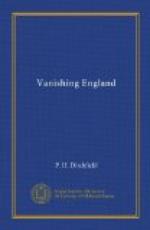Deplorable has been the fate of these old books, so valuable to the genealogist. Upon the records contained there the possession of much valuable property may depend. The father of the present writer was engaged in proving his title to an estate, and required certificates of all the births, deaths, and marriages that had occurred in the family during a hundred years. All was complete save the record of one marriage. He discovered that his ancestor had eloped with a young lady, and the couple had married in London at a City church. The name of the church where the wedding was said to have taken place was suggested to him, but he discovered that it had been pulled down. However, the old parish clerk was discovered, who had preserved the books; the entry was found, and all went well and the title to the estate established. How many have failed to obtain their rights and just claims through the gross neglect of the keepers or custodians of parochial documents?
An old register was kept in the drawer of an old table, together with rusty iron and endless rubbish, by a parish clerk who was a poor labouring man. Another was said to be so old and “out of date” and so difficult to read by the parson and his neighbours, that it had been tossed about the church and finally carried off by children and torn to pieces. The leaves of an old parchment register were discovered sewed together as a covering for the tester of a bedstead, and the daughters of a parish clerk, who were lace-makers, cut up the pages of a register for a supply of parchment to make patterns for their lace manufacture. Two Leicestershire registers were rescued, one from the shop of a bookseller, the other from the corner cupboard of a blacksmith, where it had lain perishing and unheard of more than thirty years. The following extract from Notes and Queries tells of the sad fate of other books:—
“On visiting the village school of Colton it was discovered that the ‘Psalters’ of the children were covered with the leaves of the Parish Register; some of them were recovered, and replaced in the parish chest, but many were totally obliterated and cut away. This discovery led to further investigation, which brought to light a practice of the Parish Clerk and Schoolmaster of the day, who to certain ‘goodies’ of the village, gave the parchment leaves for hutkins for their knitting pins.”
Still greater desecration has taken place. The registers of South Otterington, containing several entries of the great families of Talbot, Herbert, and Falconer, were kept in the cottage of the parish clerk, who used all those preceding the eighteenth century for waste paper, and devoted not a few to the utilitarian employment of singeing a goose. At Appledore the books were lost through having been kept in a public-house for the delectation of its frequenters.
But many parsons have kept their registers with consummate care. The name of the Rev. John Yate, rector of Rodmarton, Gloucestershire, in 1630, should be mentioned as a worthy and careful custodian on account of his quaint directions for the preservation of his registers. He wrote in the volume:—




